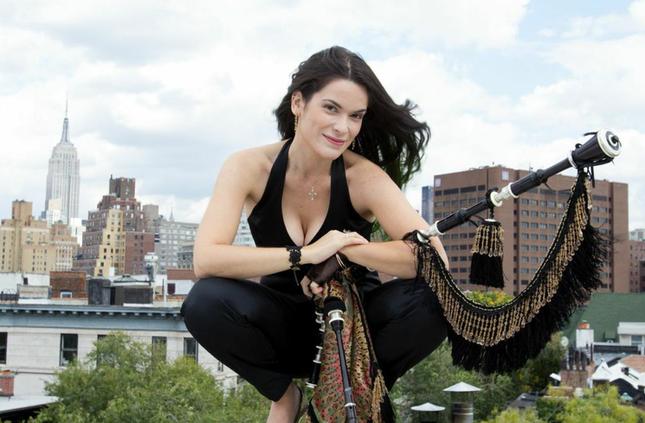Cristina Pato: the Joy and Passion of World Music at 6th & I Synagogue
By • March 26, 2015 0 2109

Don’t be surprised this weekend if you should happen to be walking around downtown that you might hear the sound of a bagpipe playing. Beyond that, it’s all surprise.
It won’t be the mournful tones of a pipe playing at a funeral, and it won’t be coming from a guy with a beard wearing plaid kilts, marching in a parade.
It won’t really be a traditional bagpipe. It will be a 34-year-old woman who lives in Greenwich Village, N.Y., and hails from Galicia, an autonomous community in northwest Spain, bordered by Portugal, Castilia and the Atlantic Ocean. It will be Cristina Pato, a rising star bereft of genre except one: originality.
It will be Pato and her own ensemble, playing the gaita, a bagpipe instrument native to Galicia, a place about which she’s almost as passionate as playing her music.
In a concert presented by Washington Performing Arts, Pato will be at the Sixth and I Historic Synagogue at 8 p.m Saturday, March 14, with her band, playing a kind of music that you’ve never heard coming out of a bagpipe, although it resonates with all sorts of cross-cultural ideas and feelings.
It will be lively, jazzy, energetic, make-you-want-to-dance and feel joy, revved up, buzzed by drums and accordion and bass, and Pato’s own sharing, get-it-out there personality punctuated by high-pitched yells , and a long way from marching Scotsmen in tribal uniform.
“It’s the music I grew up with,” she said. “The gaito is from Galicia, and so am I. “ The gaita is an instrument limited in notes, but in Pato’s hands and way of playing, the possibilities expand enormously.
Watch her on YouTube videos, and you hear her emitting high-note yelps. “I sing,” she says, “but that’s not me singing. That’s a joyful exclamation. I like joy.”
The music in some ways, and certainly the instrument, sound ancient, which is appropriate, given that the people of Galicia go back to the beginnings of man. There are Gaelic influences here, which seems only natural, but also Middle Eastern, Latino, African, Miles Davis, the Chieftains and Paqo D’Rivera are here—and all the exotic and not exotic corners of a world.
“My parents moved to Venezuela at one point and came back to Galicia,” she said. “I try to go as often as I can.”
A conversation with Pato is a little like her music. The talk is fast, quick-moving from here to there, and it touches on a lot of things: the diversity and variety of music, her band, which is very diverse itself, her influences, but always you come back to the ideas of place, region, home, and how nations sometimes try to stifle diversity.
“With Galicia, it was about language and independence,” Pato said. “Often, when one group dominates a country, it tries to take away the identity, culture and especially language of smaller groups within that nation.”
Nothing like that can happen with Pato around. She is passionate about her native home, but in the process, she makes it universal. I mentioned my own Bavarian roots within the framework of Germany, that the people there were known for their music, their culture, for a little bohemian side and for festiveness. “Sounds like Galicia,” she said. Sounds Irish too, for that matter.
Less you think Pato and her music are somehow insubstantial, think again. This is not her first appearance in Washington this year. She came only weeks earlier as part of master cello player Yo Yo Ma’s Silk Road Ensemble, a much larger group with larger ambitions, a group in which she nevertheless manages to stand out.
Pato is part of the Silk Road Ensemble’s Leadership Council. She has a Doctor of Musical Arts in Collaborative Piano from the Mason Gross School of the Arts at Rutgers University and has Masters of Music in Piano Performance and a Masters of Music in Music Theory and Chamber Music and a Master of Fine Arts Degree in Digital Arts (Computer Music). She is also the founder and director of Galician Connection, a world music forum celebrated annually at Cidade da Cultura de Galicia. In Galicia, she and her husband, bassist Juan Pedron, also have a rock band. She is also a fan of Schubert lieders.
“The piano and the gaita,” she said, “are two sides of me, which are not incompatible.”
In truth, when Pato talks about music , it is really world music—all the influences that flow into her play, playing what appears to be an unwieldy instrument as if it were a tango partner.
Watching her—whether online or on stage—you get a sense of the music, of her personality as she moves through the vibrant music from her album “Migration.” National Public Radio called her music “wild and wonderful,” which is a nice description of a woman the Wall Street Journal called “one of the living masters of the gaita”.
This is music that bonds people. “It is so easy to see how we are all connected and speak the same language when it comes to the music,” Pato said. “The energy builds during a performance and I value the energy that flows between me, the audience and the other players. That is a moment of pure magic.
Magic she is.
- Cristina Pato, the Galician bagpiper player who will be at the 6th and I Synagogue Saturday night. | Xan Padro





